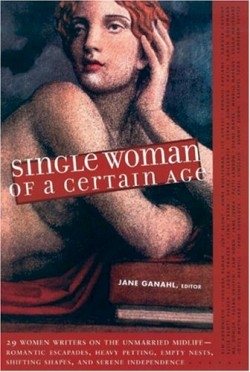Single Woman of a Certain Age
Twenty-Eight Women Writers on the Unmarried Midlife&8212;Romantic Escapades Animal Love Empty Nests Shifting Sh
The “certain age” explored is middle life. The single woman is actually twenty-eight single women, writing about single-hood, motherhood, their bodies, their pasts, and—predominantly—about love. Whether the women are shunning it or making sarcastic jokes and puns at its expense, the subject always somehow comes back to love.
They write about getting back into the dating game—be it over the Internet or at cheesy singles dances. Ellie Slott Fisher compares dating with children at home to “downing a pint of Ben and Jerry’s Chunky Monkey. It feels wonderful when it’s just the two of you, but the minute you come to your senses, you feel guilty as hell.” They write about letting go of their illusions of “Mr. Right” and their impressions of what middle life is supposed to be like. And, at the end of the day, they confront the possibility of never finding true, romantic love
The editor, who has been a journalist for San Francisco daily newspapers for twenty years and writes the San Francisco Chronicle’s “Single Minded” column, collected stories that reflect the complexity of an age that is too often overlooked and played down.
In sentimental recollections and clever observations, the women relate sensitive, observant, and often humorous stories that are as telling as they are entertaining. From Cameron Tuttle sneaking peanuts into her bellybutton, to Joyce Maynard’s date with a man who only speaks in Woodstock lyrics, the book is a fast-paced journey through the intersections of life.
While each woman offers different perspectives and witty tales, they also share much in common, and the short stories could almost flow together to form one coherent novel about a single woman of a certain age. The themes run parallel from story to story and while the pitch may rise and fall, the tone remains relatively consistent: these women are frustrated but optimistic, appreciative of the irony that life often imparts, and hopeful of what may still lie ahead.
“And ultimately,” writes Merrill Markoe, “here is the best thing I have learned: that the good part of having had a checkered past is that when you’re older, if you paid attention, you’re really good at checkers.”
For any readers who were not paying close enough attention to their own
Disclosure: This article is not an endorsement, but a review. The publisher of this book provided free copies of the book to have their book reviewed by a professional reviewer. No fee was paid by the publisher for this review. Foreword Reviews only recommends books that we love. Foreword Magazine, Inc. is disclosing this in accordance with the Federal Trade Commission’s 16 CFR, Part 255.

